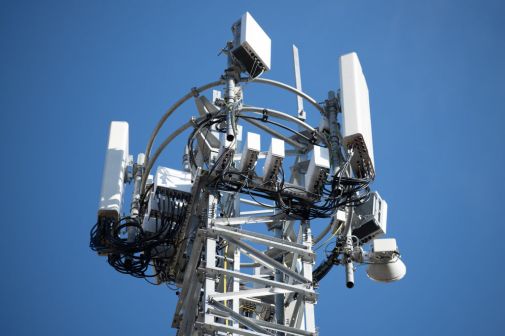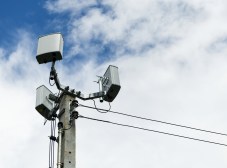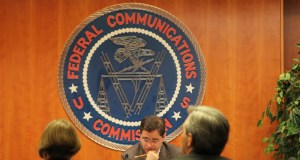FCC passes new open Internet rules along party lines
Editor’s note: This story has been updated to include comments from various telecom companies and politicians in the wake of the FCC’s decision.
After months of speculation, the Federal Communications Commission voted to enact new open Internet rules Thursday. The new rules give the FCC the power to regulate the Internet like a utility, preventing Internet service providers from creating “fast lanes” or degrading users’ access to content.
The commission passed the new rules along party lines 3-2, with the Democratic commissioners voting for the plan while the Republican commissioners dissented.
The vote comes after FCC Chairman Tom Wheeler unveiled his plans in a Wired magazine op-ed earlier this month to reclassify the Internet as a utility under Title II of the Communications Act.
Wheeler said in the op-ed he will invoke “enforceable, bright-line rules” that will ban ISPs from charging companies for faster delivery of their content, and from blocking and throttling lawful content and services. The move would cover wireline and mobile broadband Internet access.
“The Internet is the most powerful and pervasive platform on the planet,” Wheeler said Thursday. “It’s simply too important to be left without rules and a referee on the field.”
The rules surrounding net neutrality have become a lightning rod for political rhetoric since President Barack Obama came out in favor of using Title II late last year. Since then, the FCC’s Republican commissioners have accused Wheeler to bending to pressure from the White House, while multiple Republican lawmakers have called on the FCC to back away and let Congress come up with its own plan.
The Republican commissioners carried on at length Thursday, with FCC Republican Commissioner Ajit Pai saying the new rules are “an unprecedented attempt to replace freedom with government control,”
“The FCC is flip flopping, and flip flopping for one reason only: President Obama told us to do so,” Pai said prior to dissenting.
Pai and Commissioner Michael O’Rielly railed against a number of provisions in the measure, saying that the public will end up paying more taxes and telecom companies will pull back from further investing in their networks.
Telecom companies, which are largely against the new rules, have threatened to sue the minute the rules go into effect. Verizon Communications Inc. brought a lawsuit against the FCC’s prior rules, which were overturned in January of last year, leading the commission to figure out a new legal way forward.
O’Rielly called Title II a “convenient legal theory” that doesn’t fit the current Internet landscape due to its initial purpose of reining into telephone monopolies.
“Every bad idea ever floated in the idea of net neutrality has come home to roost in this item,” O’Rielly said.
Verizon and AT&T Inc.wasted no time denouncing the decision via statements, including one from Verizon that was dated Feb. 26, 1934, and produced in old typewriter-like teletype to drive home their opinion that the FCC’s ruling puts “1930s on the Internet.”

The telecom company issued a statement following the FCC ruling in 1930s teletype font to drive home the opinion the FCC imposed “1930s rules on the Internet.”
“The FCC’s move is especially regrettable because it is wholly unnecessary,” said Michael Glover, Verizon’s senior vice president of public policy and government affairs, said in a statement. “The FCC had targeted tools available to preserve an open Internet, but instead chose to use this order as an excuse to adopt 300-plus pages of broad and open-ended regulatory arcana that will have unintended negative consequences for consumers and various parts of the Internet ecosystem for years to come.”
“Instead of a clear set of rules moving forward, with a broad set of agreement behind them, we once again face the uncertainty of litigation, and the very real potential of having to start over – again – in the future,” Jim Cicconi, AT&T senior executive vice president of external and legislative affairs, wrote in a blog post Thursday. “This may suit partisans who lust for issues of political division, but it isn’t healthy for the Internet ecosystem, for the economy, or for our political system. And, followed to its logical conclusion, this will do long-term damage to the FCC as well.”
Politicians also weigh, with statements falling in line with how each party voted on the matter. Obama weighed in Thursday afternoon, saying the FCC’s decision will “protect innovation and create a level playing field for the next generation of Americans.”
A number of Republican lawmakers voiced their opposition, including Speaker of the House John Boehner, R-Ohio, who said rules “undermine a free and open Internet and hurt our economy.”
“The FCC is supposed to be an independent agency, but the White House has once again meddled where it shouldn’t in order to advance what one commissioner has described as ‘a solution that won’t work to a problem that doesn’t exist,'” Boehner said in a released statement. “More mandates and regulations on American innovation and entrepreneurship are not the answer, and that’s why Republicans will continue our efforts to stop this misguided scheme.”
The rules are expected to go into effect 30 days after they are listed in the Federal Register, but it may be weeks before that happens. FCC Commissioner Pai has made a point leading up to the vote that the 300-page ruling has not been made public.
After the vote, Wheeler said that the rules will be released once the dissents have been included in the document, as the agency is legally required to do. After that, the FCC will release the rules to the public.






